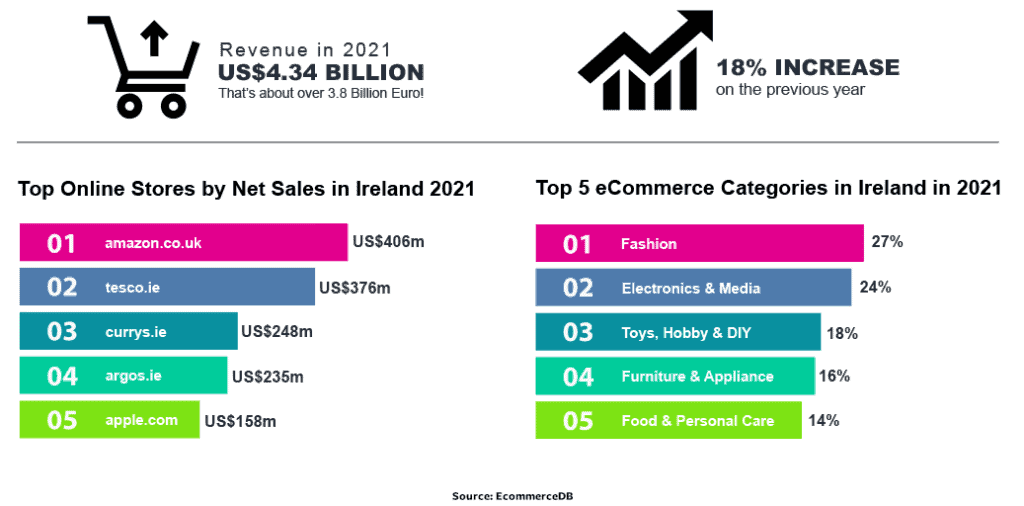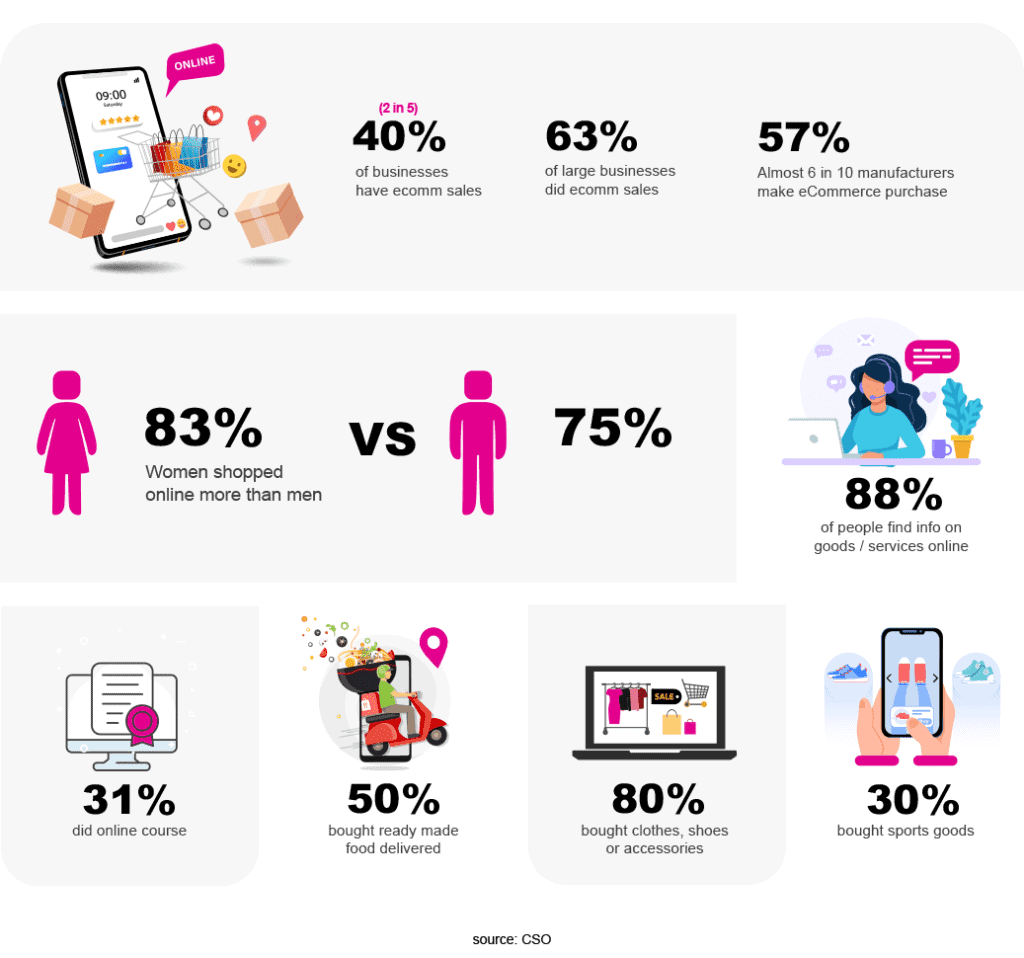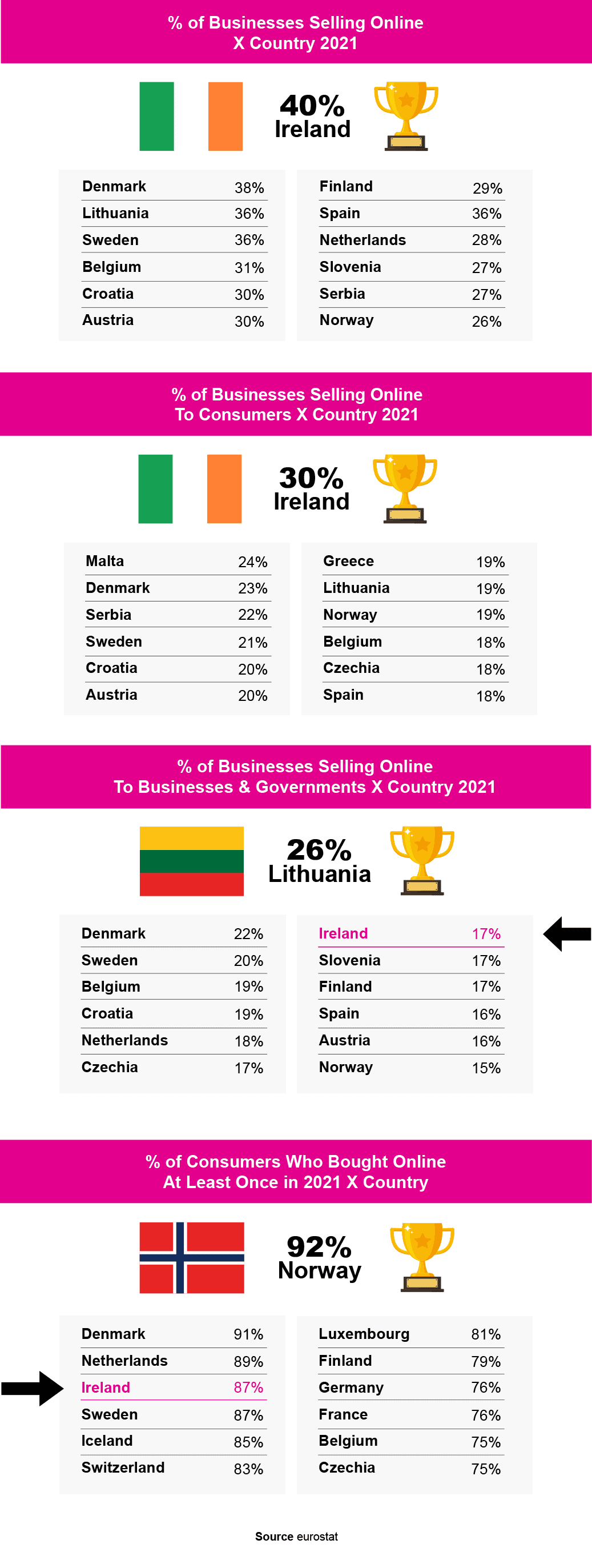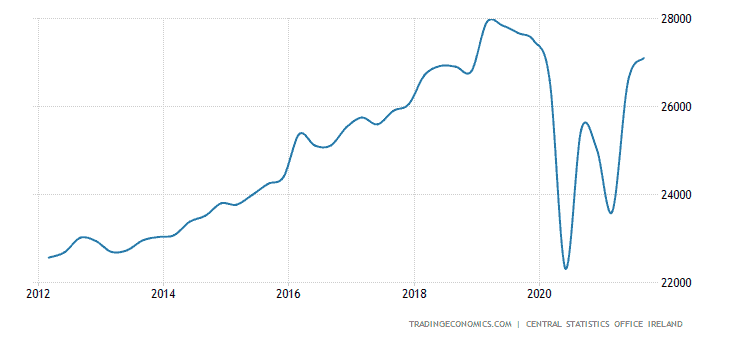eCommerce in Ireland 2022
How does Ireland compare to other nations in terms of eComm activity? This report makes for some interesting comparisons!
Recently we had a good scoot through a variety of reliable data sources, to analyse the state of eCommerce in Ireland over the course of last year. And we’ve compared our online shopping habits with those of our European neighbours. You might be surprised at a couple of the findings!


So how do we compare in terms of spend and eComm activity? Pretty well it seems!
We top of the list in the context of the percentage of companies with overall eCommerce sales capability and with B2C eCommerce sales capability. However, we are in 6th position when it comes to B2B & B2G (Government) eComm selling. Note: This includes all enterprises except the financial sector – with 10 or more employees.
And in terms of counting the percentage of individual consumers who had made at least 1 online purchase in last 12 months – we do pretty well; clocking in at fourth on the table.
Note: this is data from the EU, EEA and EU Candidate countries. The UK has no data listed for 2021. (Source Eurostat)

It’s no surprise that the vast majority of people (both women and men) found product/service info online and made eComm purchases in 2021. But it is interesting to see that by comparison to our EU neighbours, we are leaders in terms of being enabled to transact B2C eComm sales (and overall eComm sales). And 87% of Irish people bought clothes, shoes or accessories online in 2021 – making us one of the Big Online Shoppers in Europe!
And this stat. put us in fourth position on the table, with Norway taking top spot.
Selling Online Set to Become Essential
Back in 2012, only 23% of Irish businesses were selling online. Now 2 in 5 Irish businesses have eComm capabilities. And the bigger the business – the higher the likelihood of selling online (63% of large businesses did eComm sales in 2021).
And obviously these stats. are set to grow – while larger businesses can typically self-fund investment in eCommerce websites, smaller businesses have been encouraged to embrace online selling through a series of government grants, administered via LEO and Enterprise Ireland.
We’ve seen up close so many clients transform their eComm presence in the last 2 years – and we’re not just talking businesses pushing consumer products; B2B selling and managing trade accounts through eCommerce is becoming standard practice. Though there is still a lot of work to do to push forward on the B2B side – we’ve seen in practice that bespoke pricing structures for different trade customers and similar sensitivities can be a barrier to embracing online selling to the trade. Nevertheless – the train is coming down the tracks; so better to jump onto it sooner than later.
Irish Government falls Behind
While Ireland lies top of the tables in two of the comparisons above and is third in another, you’ll see that in the B2B and B2G (government) league – we are not quite as strong. Could this be down to the Irish government itself lagging in this context? At Inspiration, we noted recently that the only cheques that come through the door these days, are issued by clients operating in the public service. And while procurement may be handled through the government portal, often payment is by traditional methods – cheque or bank transfer. No doubt this will change in time and to be fair the government has had a lot to cope with in recent years. But for companies intending to transact with public service bodies into the future – eComm facilities are likely to become essential. But probably not in the immediate future.
What next for eCommerce?
Given recent events, it seems hopeless to make any predictions. But lets look at something simple; Irish Consumer Spending per capita – we are almost level with pre-pandemic spending.

And before the war in Ukraine, the prediction of Ireland’s compound annual growth rate (CAGR 21-25) for the next four years was listed at 6% (EcommerceDB). Obviously consumer confidence has taken a significant dive recently and inflation and other economic factors need to be considered (e.g. more offline sales with the reopening) – but we can safely say eCommerce will continue to play a significant and growing role in terms of increased consumption.
So no doubt 2022 will be another massive year for eCommerce. Perhaps not the same level as 2021, as in-store is making it’s comeback, but the genie is out of the bottle when it comes to eCommerce.
eCommerce = Convenience.
Sources
Source Eurostat
Source Eurostat
Source EcommerceDB
Source CSO